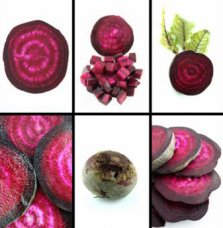
Source: Jamaica Gleaner-https://jamaica-gleaner.com/article/news/20160629/ounce-prevention-benefits-beetroot
Medical research suggests that beetroot, also known as beet, may be a super food that offers many outstanding health benefits. The familiar red beetroot is from the same family as sugar beets but is nutritionally quite different. Sugar beets are white in colour and used to manufacture sugar by an extraction process. Sugar cannot be obtained from beetroot, as its sugar content is quite modest.
Beets can be roasted, steamed, boiled, pickled or eaten raw. They can be mixed with other vegetables to create tasty salads. The juice can be made by peeling the beetroot and blending it alone or in combination with carrot, orange, pineapple, apples, lemon and ginger. Strain and enjoy.
Nutritional content of beetroot
A single cup of raw beets contains only 58 calories, 13 grammes of carbohydrate (nine grammes of sugar and four grammes of fibre) and two grammes of protein. Beetroot is a rich source of vitamins B Complex, A, C; the minerals manganese, magnesium, phosphor, potassium, zinc, copper, iron, selenium and calcium. Beets are particularly high in dietary nitrate, which is believed to account for many of the potential health benefits of this vegetable.
By the way, beets get their colour from a pigment called betalain. Depending on the type and concentration of betalain, the colour of beets varies from red to purple to even yellow or orange.
Health benefits of beetroot
Many studies suggest that eating lots of plant foods like beetroot lowers overall mortality and the risk of obesity, diabetes and heart disease, while increasing overall energy and well-being.
Heart and blood pressure: In 2008, a study published in the medical journal Hypertension looked at the effects in healthy volunteers of drinking 500mls of beetroot juice. The researchers found a significant reduction in blood pressure after ingestion of the juice.
Another study in the journal Circulation found that patients with heart failure, when put on a diet high in the nitrates abundant in beetroot juice, had improvement in muscle strength.
Nitrates are natural substances used by the body to produce an important gas called nitric oxide. Researchers believe that the high nitrate levels in beetroot juice, which leads to elevated nitric oxide production, are responsible for the food's benefits to blood pressure and heart health. Beetroot could well prove to be a low-cost, effective aid in treating cardiovascular conditions and high blood pressure.
Dementia: Researchers have found that drinking beetroot juice can help to oxygenate the brain and slow the development of dementia in older adults. Although blood flow to parts of the brain decreases with age leading to declining mental function, the consumption of beetroot juice can improve brain blood flow and oxygenation.
Another important nutrient in beetroot choline helps learning, memory, sleep and muscle movement. Choline aids to maintain the structure of cell membranes and in the transmission of nerve impulses.
Diabetes: Beetroot contains an important antioxidant called alpha-lipoic acid, which lowers glucose levels, improves insulin function and helps prevent the nerve damage common in diabetes called peripheral neuropathy.
Because of its high fibre content, the modest quantity of sugar in beetroot should not disturb the blood sugar control of diabetics. The fibre also helps to prevent constipation and promote healthy digestion.
Physical performance: Supplementing with beetroot juice improves the oxygenation of muscles during exercise. Studies show that an increased intake of dietary nitrate enhances exercise tolerance during endurance workouts. In one study, those who drank beet juice before exercise were able to exercise for up to 16 per cent longer. Beetroot could well improve the quality of life for people with circulatory, respiratory, or other diseases, by an improvement in their oxygenation.
Detoxification: The betalain pigments that give beets their colour also support your liver detoxification process. They help to break down toxins into more harmless substances so they can be excreted from the body. Traditionally, beetroot juice was used to help the liver to purify the blood.
Possible problems with beetroot
If improperly stored, nitrate-containing beetroot juice may become contaminated with bacteria that convert nitrates to potentially harmful nitrites. Beetroot juice is best drunk fresh or refrigerated before use. Consuming lots of beetroot may cause a red discolouration of urine or stool. This is not harmful.
A high-nitrate diet may interact with certain medications such as drugs used for angina like nitroglycerine, or the erectile dysfunction drugs like Viagra and Cialis.
Please remember that it is your overall diet that is most important in preventing disease and promoting good health. So combine your beetroot with a variety of other healthy foods.

